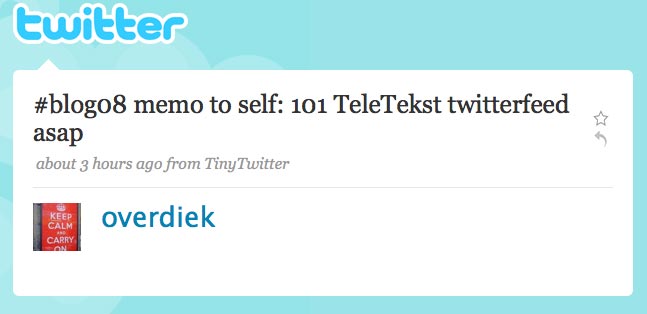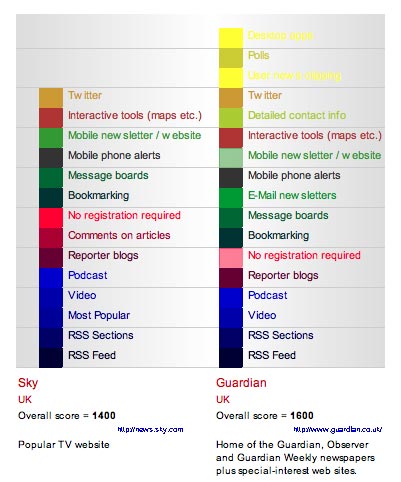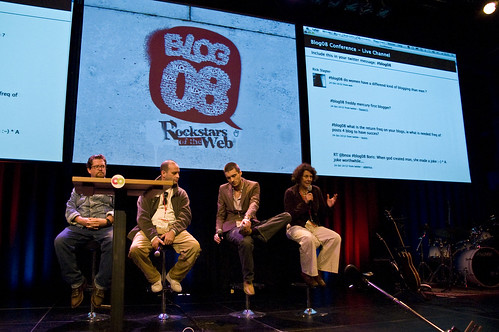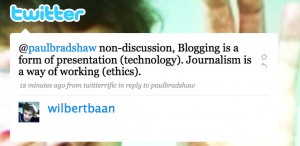“OK, newspapers shouldn’t turn off RSS feeds… I was wrong,” writes Malcolm Coles. After a little reflection on comments received about his post ‘ Newspapers: Turn off your RSS feeds‘ [also pasted on the Online Journalism Blog and his own blog] he concludes that link-bait headlines are dangerous… His fuller explanation is at this link…
Tag Archives: Online Journalism blog
LA Times: Micropayments – a rainbow for journalism… or a Hail Mary?
The prospect of micropayments for news raises its head once again. This article follows in the wake of David Carr’s piece in the NY Times, ‘Let’s invent an iTunes for news’ which has been neatly debunked by Paul Bradshaw on his Online Journalism Blog.
Might have worked a few years back, but most agree that horse has already bolted. Full story…
Social network for journalism researchers
Journalism lecturer and blogger at the Online Journalism Blog (OJB), Paul Bradshaw, has set up a rather nifty social network for journalism and news researchers using Ning:
“It’s an attempt to provide a way for journalism students and academics to get in touch with others researching the same area, exchange ideas and tips, and ask for help on everything from finding relevant literature to sourcing contacts and the best research methods.
“Research is traditionally a solitary, frustrating endeavour. It doesn’t need to be. If you work with journalism students, please encourage them to join the network and contribute a question or an answer,” writes Bradshaw on the OJB.
There are 139 members at time of writing, so go get yourself signed up.
Reflections on Blog08 and ideas for next year’s event
So the brief day that was Blog08 is over and our blogging reporter, Anne Helmond, is back home. She rounds up over on her own blog, with a few after-thoughts. She also rounds up a presentation by a blogging politician, Boris van der Ham, who has been voted the most web savvy of Dutch House of Representatives members.
She says:
“Overall, it was a good first blog conference and I hope that next time organizers Ernst-Jan Pfauth and Edial Dekker will keep in mind that not every great blogger is a great speaker and that blogging can be approached from even more different angles and perspectives.”
Thanks to Anne for all the insightful and speedy feedback.
Meanwhile, over at the Online Journalism Blog, Paul Bradshaw – who participated in a panel – does a little piece to camera reflecting on the day’s events:
The event was ‘eclectic and random’, he says – just like blogging, but can we please get past the ‘old chestnut’ question of ‘journalism v blogging’? he asks. You can also watch some other video clips here.
Blog08: The never-ending journalism vs blogging debate continues…
Bloggers Hugh McLeod, Loren Feldman, Pete Cashmore and Elisabeth Winkler get up on stage to answer questions from the floor and the live backchannel at Twitter.
Rick Slagter asks the first question: ‘is blogging is the rescue of slow journalism?’
Loren Feldman is very explicit when comparing bloggers to journalists: “Bloggers aren’t journalists. You’re just a bunch of guys sitting in your livingroom, writing things.”
Pete Cashmore comes to the defence of bloggers and jokes that “sometimes we dress up and we wear pyjamas.” He describes the current media landscape as an eco-system where bloggers and journalists complement each other.
Winkler sees the overlap between journalism and blogging in the connections between opinion and fact. However, a fact needs a context because everyone has an agenda, and the major media aren’t very clear about their agenda. She sees blogging as a little more transparent.
Cashmore compares the discussion to the endless discussion that is still going on surrounding the term ‘web 2.0’. We spend a lot of time and posts on trying to define it, which leads to endless discussion, he says. The whole journalism versus bloggers debate depends on how you define journalism.
Paul Bradshaw from the Online Journalism Blog enters the debate with his opinion that ‘is blogging journalism?’ is an old question and that we need more challenging ones.
The best part of the discussion seems to be happening on Twitter, where Wilbert Baan (Interaction Designer of the Volkskrant newspaper website) replies to Paul Bradshaw’s statement with this insightful comment:
And me? I think the distinction between the medium and practice of blogging is an important one, especially in relation to journalism.
Blog08: Journalism versus hearth blogging
Not your average panel with Tim Overdiek, deputy editor in chief at NOS news; Clo Willaerts, marketing manager for Sanoma Magazines Belgium; Paul Bradshaw from the Online Journalism Blog; and Piet Bakker, professor at the Hogeschool Utrecht.
The journalism/blogging panel aims to answer questions gathered via de Nieuwe Reporter, one of the largest Dutch journalism blogs.
Tim Overdiek from NOS News shares that over a hundred NOS colleagues from a total of 400 have contributed to weblogs.nos.nl. Only forty employees are active bloggers but a hundred contributions in the form of either comments or blog posts is a certainly good number.
He remarks that professional journalists often don’t see bloggers as collaborators but as a form of contribution, as something they can use. There is no direct participation. The participating journalism that Dan Gillmor refers to is not happening in the Netherlands, according to Overdiek.
We’re currently moving beyond blogs, and the practice of blogging has gone beyond the medium of the blog and has partly and moved to Twitter for example. There is a whole world to gain for bloggers and also for organisations to actively set out to get people blogging.
It is interesting to note that during one of the previous sessions Tim Overdiek sent out a tweet to remind himself to create a 101 Teletekst Twitterfeed asap.

Teletekst is the Dutch equivalent of the BBC Ceefax and the 101 page is the standard page for news headlines. It is interesting to see how one of the most popular ways to keep up with the news is going to be syndicated on Twitter in the near future. The NOS is focusing on embracing the new social media and sees syndicating existing content on different platforms as the next step.
The question that was selected from the Nieuwe Reporter was a rather odd choice since there was a lot of discussion about the relevance and phrasing of the question in the comments (in Dutch). Unfortunately the question also eventually drived the discussion nowhere:
Imagine there would be a stock exchange for newspapers, broadcasters, magazines, weblogs, and other media. Which stocks would you buy when taking the next five years in account?
Tim Overdiek: Buy stocks in NOS, we have great outlets, we have different platforms such as mobile TV, blogging and Twitter. The NOS media department is pretty tech savvy. However, he advises not to bet on just one company because there are too many interesting things going on in different places.
Piet Bakker would buy stocks in magazines because the problem with blogging and internet is that to monetize it is quite difficult.
Paul Bradshaw would also buy stocks in magazines because all of the advertising on the internet pretty much goes to Google. Offline and online advertising are not on the same level yet and on top of that magazines have a lot of muscle. Bradshaw thinks that they will buy out successful blogs. Newspapers are also trying to be more like magazines which shows the bright future of magazines but they don’t see it quite yet. casinochan signup
Journalists should work with bloggers on a level playing field. He [Bradshaw] mentions the example of a newspaper that recently recruited 40 bloggers but it’s not a top down relationship with one main editor that makes all the decisions. He sees this as a good way forward because journalists and bloggers should treat each other like citizens.
Stephen Quinn on mobile journalism
“You need to have the fundamentals in place before you start playing with new technology. The skills are the same as for traditional media plus an awareness of what’s possible, and a willingess to play with the tools, a willingness to accept that journalism may move beyond what we currently know,” Stephen Quinn, academic and author of Knowledge Management in the Digital Newsroom, told Paul Bradshaw from the Online Journalism Blog in this interview.
Quinn discusses mobile journalism and how the mainstream media are getting involved:
links for 2008-06-26
-
“most media people don’t realise that blogging is a community strategy. They think of it as a publishing process and, perhaps, as articles published with a particular tone of voice. They certainly don’t think of it as a conversation.”
-
“A study by The Kelsey Group predicts that small and medium-sized businesses in local markets will increase their video spending from $10.9 million in 2007 to $1.5 billion in 2012.”
-
“Welcome to the new-look home of Sky News online. I hope you will find it useful, informative, entertaining, and an improvement on its predecessor.”
-
The Associated Press will begin rolling out details of its new pricing to members this week, a plan that will return up to $21 million to its U.S. member newspapers.
-
As content recognition software gets more sophisticated, expect more copyright-related battles online like the recent AP-blogger flap
-
Alan Rusbridger ruminates at the Frontline Club, pressed by Stephen Sackur, on the changing face of news and the problems of going 24/7:
-
Facebook has confirmed that it will launch in-line Mini Feed comments later today.
-
Semantic journalism is a vision for the future of journalism. As the writer works on her article, her computer would gather data on the matter, from pictures to other articles to assessing global opinion trends.
The European News Interactivity Index
Nicolas Kayser-Bril, contributor to the Online Journalism Blog and Observatoire des Media, has created an index of the interactive tools used by European news websites.
The index compares and contrasts which media organisations make use of tools such as Twitter, mobile alerts and social networks, as well as noting their policy on user registration for interactive services.
News sites from the UK and France, to Macedonia and Hungary are featured – entries for additional organisations should be submitted to nicolas@observatoiredesmedias.com.
Below is the index’s comparison of interactive features used by Sky’s site vs Guardian.co.uk:

The project is an extension of the work by Birmingham Post reporter and blogger Joanna Geary, who looked at the use of interactive tools by business news sites.
Sneak preview of BBC hyperlocal web service
Andrew Williams, over at the Online Journalism blog, reports on a preview of the BBC’s hyperlocal web service, which will utilise geotagging and mapping, given at last week’s Broadcast News and the Active Citizen Conference at Leeds University
According to BBC Yorkshire’s Catherine Hearne, who unveiled the plans, 60 such sites are planned offering customisable local content as well as an increase in multimedia.
“There are of course other local news providers and we see ourselves as complementing the work that they do. Clearly the local newspapers will be offering a much more localised service that [sic] we will be doing even with this advance,” Hearne told conference delegates.

